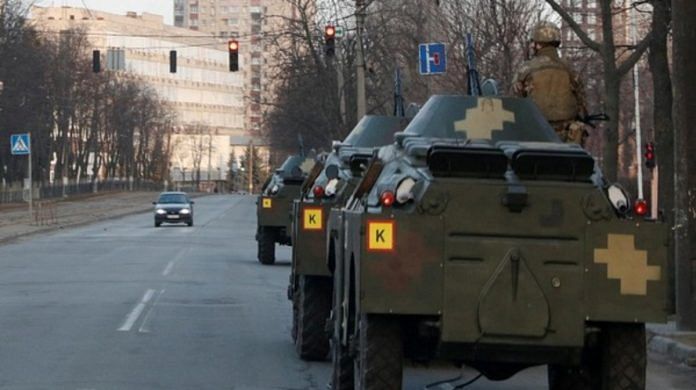New Delhi: While Russia has launched a blitzkrieg against Ukraine with its arsenal of rockets, cruise and ballistic missiles, the Russian forces have so far resisted forcing their way into major cities even as operations enter the third day today.
Although the difficulties posed by FIBUA (fighting in built-up areas) and MOAT (military operations in urban terrain) will be key considerations for the Russians against storming cities such as the Ukrainian capital, Kyiv, the Indian defence establishment and top retired Army officers feel this approach is more about psychological warfare.
FIBUA and MOAT are military terms used for operations where armed forces have to fight in built-up areas in enemy territory, be it on urban or rural terrain, where the other side’s regular soldiers, civilians, or militia can offer resistance.
“Russia is getting a lot of diplomatic slaps over the Ukraine operation, and one of the things which will turn the tide for them will be civilian casualties. Hence, they are targeting military positions. FIBUA will bring in casualties in truckloads as far as civilians and their own soldiers are concerned,” Col Vivek Chadha (Retd) of the Delhi-based Manohar Parrikar Institute for Defence Studies and Analyses (MP-IDSA) told ThePrint.
However, he added that the main reason Russia is resisting storming into major cities such as Kyiv is that its primary objective is regime change — to put in place a new government that’s aligned with Moscow’s security interests — and not occupation.
He further said that the Russians are employing the same tactics as India did during the 1971 war, when the encircling of Dhaka led to the mental and psychological collapse of the Pakistani general in charge of East Pakistan, A. A. K. Niazi.
“You will have to understand that the side that enters into a built-up area suffers the most casualties and it is going to be very bloody. So, the Russian strategy is the show of strength and intention to cause a mental and psychological collapse of the Ukrainian leadership,” he said.
He added that in FIBUA terrain, a civilian or militant with a light machine gun in a good position can stop the advance of a column.
Reports from the ground have said that the Ukrainian authorities are freely distributing arms and ammunition to anyone willing to fight the Russian troops.
Also read: 13x budget, 13x aircraft, 4x manpower & nukes: How Russian military compares with Ukraine’s
Applying pressure for regime change
Lt Gen Vinod Bhatia (Retd), former director general of military operations and a paratrooper himself, also said the Russians were intentionally avoiding built-up areas because the fighting would lead to huge casualties they can’t afford.
He said that from a military point of view, even though the Russian attack has entered its third day today, the casualty figures are very low — which indicates deliberate targeting of only military positions, and no major battles having occurred between advancing soldiers and Ukrainian troops.
The operation could eventually lead to the imposition of Russia’s will on Ukraine — followed by the Western powers fuelling militancy against the new government and Russian authority, he said.
Lt Gen Subrata Saha (Retd), former deputy chief of the Indian Army and ex-member of the National Security Advisory Board (NSAB), said that he sees the Russian strategy as one of applying psychological pressure to push in a regime change, rather than launching a full-scale offensive causing a large number of casualties.
He added that the Russian forces are either motorised or mechanised, and for them to dismount and operate on foot — in territory familiar to the enemy — would be a different game altogether.
The Russians will be looking to avoid collateral damage, and — seeing how the world has responded to their actions — are in no great hurry, he said.
“Right now, the response to the Russian actions is sanctions, and all these sanctions are interlinked. So, while these will impact Russia, Moscow knows they will also impact those who are imposing them. So, the Russians would not want to get into FIBUA or MOAT, risk casualties and create a global backlash, because the visuals will be dramatic,” Lt Gen Saha said.
Sources in the Indian defence and security establishment also felt that the Russians are not forcing their way into cities because they are looking at accomplishing their aim of having a pro-Moscow government in place through psychological pressure rather than occupying Ukraine.
(Edited by Rohan Manoj)
Also read: US sanctions Putin as Ukraine discusses location of potential peace talks with Russia



